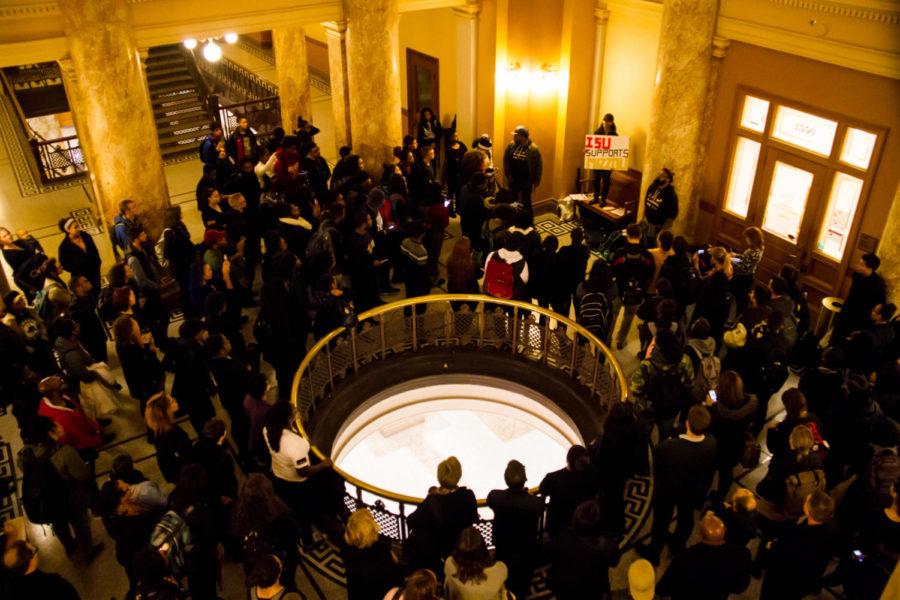Editorial: Listen to all sides of the story
Students, staff and community members meet for a rally in Beardshear Hall Monday evening. The rally was to show solidarity with the students protesting racism at Mizzou, and called for action and reform from the ISU administration.
November 17, 2015
Ever since the Sept. 12 ripping of a poster at the CyHawk tailgate, the conversations regarding how students of color are treated on campus have been continuous and louder than ever. While what these students have been experiencing has gone on for a far longer period of time than this semester, the events of the tailgate have brought the conversation to the forefront of the university’s consideration.
These students want change — it’s evident from this semester’s mounting tension. Meanwhile, the university is scrambling to properly respond and take action.
On one side, we have students demanding action and sharing feelings of fear and incidents of racism on campus. On the other, we have the university saying it’s all ears and willing to make changes but that students need to be specific in sharing experiences and demands.
The flare-up on social media is just one avenue that backs up the fact racism is present on this campus. Anyone who monitored Yik Yak on Monday night during and after the rally that took place in Beardshear Hall in support of students of color at the University of Missouri witnessed the differing opinions about the presence of racism on the campus and how the issue is, and should be, dealt with.
These major changes students are asking of the university require thought and deliberated detail considered by numerous voices on campus, which takes time. For example, one of the suggestions was a center for Latino students, which is an excellent suggestion, but that’s something that probably can’t be created in two months’ time.
All sides of this situation deserve to be heard.
Both also deserve to be actually listened to and learned from.
Universities, especially public, land-granted universities, are spaces for people to learn about other viewpoints and understand more about the world.
Brian Eslinger, lecturer of philosophy and religious studies and former minister at Unitarian Universalist Fellowship of Ames, often speaks about how to live with others different than ourselves. He referenced the theory of the “color line” spoken about by Frederick Douglas and Martin Luther King, Jr. and others, saying the color line is not about being black or white, but it divides those who would seek to live together and those who “would perish as fools.”
“It’s very difficult to be empathetic to an experience that is not yours,” Eslinger said regarding the differing sides of the campus conversation. “It requires work. It requires a real desire to see ourselves as accountable for each other. That changes our frame of reference. It’s not about being right. It’s about the responsibilities of all of us as a community to care for everyone in that community. To take all of their experiences seriously.”
So the Iowa State Daily wants to hear about your experiences. If you’ve experienced racism, other forms of discrimination or feelings of insecurity on campus, and you feel comfortable sharing your story, please feel free to reach out to us at [email protected].

















